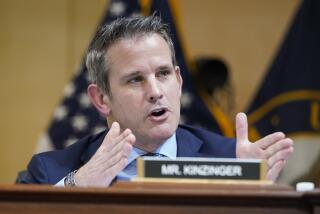Graham Makes Presidential Campaign Official
- Share via
MIAMI LAKES, Fla. — Sen. Bob Graham spotlighted the major themes of his late-starting run for the Democratic presidential nomination Tuesday, blasting President Bush as an unsteady leader against terrorism and asserting that his own political resume in this pivotal state shows he can win the White House.
“This administration has ignored homeland security in all but the words themselves while it focused all its energy on Iraq,” Graham said at a rally officially launching his campaign. He also accused Bush of disregarding dangerous terrorist threats at home and abroad to “settle old scores” against now-deposed Iraqi dictator Saddam Hussein.
Although Graham quietly entered the crowded Democratic field in February, he delayed a formal announcement while recuperating from open-heart surgery and waiting for the Iraq war to subside.
He brings legislative and executive experience to the race, as a two-term governor and three-term U.S. senator from the vote-rich state that tipped the presidency to Bush in 2000. His Florida roots could help Graham rally party activists still burning over that election outcome.
As a recent chairman of the Senate Select Intelligence Committee, he boasts expertise in the security and foreign policy issues that have dominated Washington since the Sept. 11 attacks.
But analysts say the methodical, 66-year-old Graham must move fast to quell doubts about whether he has the charisma, energy and national support to overtake several Democratic rivals in the presidential contest.
Party caucuses and primaries begin in about eight months, and Graham is little known in the key states of Iowa and New Hampshire.
“You have to consider him a significant political figure,” said Stuart Rothenberg, an independent political analyst in Washington. “The problem is, that’s only a small part of what running for president is all about. His campaign has barely begun, and it has a long way to go.”
Graham’s rally was held in the Dade County town carved from his family’s dairy farm -- the real estate development that helped make him a multimillionaire. Flanked by his wife, Adele, his four daughters and his 10 grandchildren, he spoke to a crowd of supporters gathered on a sunny and sweaty day on Main Street in Miami Lakes.
Like the other eight Democratic presidential contenders, Graham railed against the president’s domestic policies. He highlighted his opposition to Bush’s 2001 tax cut and accused the administration of squandering budget surpluses, failing to stop job losses and coddling corporate wrongdoers.
Bush, Graham charged, has “divided our nation between the few at the top served by this administration and the many who are left to fend for themselves with the moral equivalent of duct tape.”
But Graham also attacked Bush directly in the arena that polls show is Bush’s strength among voters: the campaign against terrorism. Noting that he supported the 1991 Persian Gulf War, waged by the president’s father, Graham disputed Bush’s contention that this year’s attack on Iraq was a crucial part of the battle against terrorists.
Graham is the only Democratic senator seeking the presidential nomination who opposed the congressional resolution in October that authorized Bush to use military force against Hussein’s regime. “Instead of pursuing the most imminent and real threats -- international terrorists -- this Bush administration chose to settle old scores,” Graham said. “We all agree that Saddam Hussein is an evil man, but he is not our biggest threat.”
He said the administration’s foreign policy had needlessly ignited hostility to the United States around the world, “not only by those who hate and threaten us but also by those who share our values.”
Graham’s position on the war separates him from the rest of the Democratic pack. Four of the other candidates voted for the use-of-force resolution -- Rep. Richard A. Gephardt of Missouri and Sens. John F. Kerry of Massachusetts, John Edwards of North Carolina and Joseph I. Lieberman of Connecticut. The four others opposed or criticized the resolution -- Rep. Dennis J. Kucinich of Ohio, former Vermont Gov. Howard Dean, former Sen. Carol Moseley Braun of Illinois and the Rev. Al Sharpton of New York.
Graham has a fairly liberal congressional record on several other issues, voting for abortion rights and gun control while opposing Bush’s tax cut proposals and some conservative judicial nominees. But he also is a strong supporter of the death penalty.
Referring to this mix of positions, he joked during a debate Saturday among the Democratic contenders that he came from the party’s “electable” wing.
His advisors hope Graham can demonstrate empathy for working people. They say his upbringing on a farm can help him reach out to rural voters. And they tout his decades-long practice of spending occasional days on the job with ordinary Americans, from truckers to teachers to orange pickers.
These “workdays” -- 386 at last count -- are likely to become a central campaign theme. On Friday, for example, Graham plans to teach for a day in New Hampshire.
By Graham’s own admission, he started the campaign as a “rusty” speaker. On Tuesday, he occasionally stumbled over his prepared text, despite aid from an electronic prompter.
Charles Cook, a political analyst in Washington, said Graham has “two huge obstacles.” First, Cook said, he has not yet shown strength in a state with an early caucus or primary. Second, “He’s got to improve enormously in his skills as a candidate.”
More to Read
Get the L.A. Times Politics newsletter
Deeply reported insights into legislation, politics and policy from Sacramento, Washington and beyond. In your inbox twice per week.
You may occasionally receive promotional content from the Los Angeles Times.










